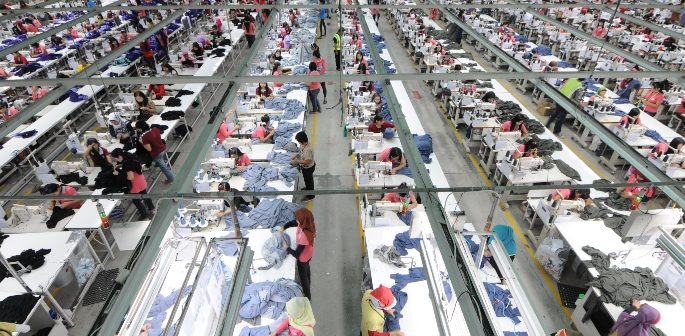"I'm not giving money back they might sack me."
A worker at a Leicester garment factory has claimed that she has to pay back some of her minimum wage to the factory.
The worker’s payslips formally record that she is paid the minimum wage of £8.91 per hour.
However, the payslips had a handwritten number on them which the worker alleges is the amount she is told to pay back to the factory.
The worker told Sky News:
“They say that you have to give this money back.”
“They said, you know, ‘I can’t give you minimum wage, I can’t afford to pay you minimum wage because prices are very low in our product.’
“I’m worrying that if they find out that I’m not giving money back they might sack me.”
The exploitation comes after Boohoo cut ties with several manufacturers earlier in 2021 after saying they were unable to demonstrate the high standard of transparency required.
Anti-modern slavery charity Hope For Justice subsequently conducted its own investigation, concluding that the new audit and enforcement clampdown on exploitation by firms like Boohoo is not working as “factory bosses are getting really creative and innovative” in how they hide it.
The garment factory worker said that before Boohoo’s inspection, they were earning £5.50 an hour and the new system was implemented after Boohoo insisted that staff were paid the minimum wage.
There is no suggestion that Boohoo knew about this practice.
In a statement, a Boohoo spokesperson said:
“Boohoo is committed to Suppliers are wholly expected to adhere to these standards, and any concerns such as those raised by Sky News are immediately investigated.
“Since last year’s Independent Review, the Group has repeatedly stated its determination in rebuilding a garment industry in Leicester with a robust, fair and transparent supply chain.
“Suppliers are visited more frequently, sub-contracting has been removed, products can only be purchased from our approved supplier list; mandatory whistle-blower helplines have been installed at every supplier; and the use of technology is allowing the Group to forensically monitor suppliers and their financial records.
“Over the course of the next twelve months, we are transitioning all of our suppliers to the Fast Forward forensic auditing model, widely recognised as the leading auditing model in the UK.
“We continue to work closely with local authorities such as the GLAA, as well as anti-slavery charity Hope for Justice who have stated:
“Boohoo have been proactive in their measures to mitigate the risk of labour exploitation within their supply chains, and have made a strong commitment to tackling the unscrupulous and exploitative employment practices that still sadly exist within some suppliers to the garment industry.
“We welcome Boohoo’s work with Fashion Enter and the new textile academy in Leicester, as well as their collaboration with Hope for Justice and our business-focused division Slave-Free Alliance on proposed awareness and prevention initiatives in the industry to better evaluate what intervention methods will be most effective.”
While Boohoo did not address whether it was looking into the worker’s claims, Group CEO John Little said:
“As a group, we are wholly confident that the significant steps that we have taken over the last twelve months are resulting in a fair, robust and transparent supply chain.
“The Group continues to closely monitor its suppliers, with swift action taken against any suppliers who fail to demonstrate the high standards that we expect.
“Nobody has done more to drive change in Leicester than ourselves, and our work continues unabated.”
Leicester East MP Claudia Webb has called for more to be done to protect garment factory workers in the city.
She said:
“Sadly, worker exploitation in Leicester’s garment factories is nothing new.”
“The practice of workers being forced to repay wages and holiday pay back to their bosses has been going on for some time.
“This wage exploitation is not hidden.
“The problem is that too much of the onus to expose the extent of the exploitation is put back on workers themselves.
“The brands and retailers know this is happening but continue to limit the nature of their audits to nothing more than a toothless tick box exercise.
“I am dealing with cases every week of workers telling me about how poorly they are being treated and how wages are being stolen from them.
“The workers want to remain anonymous because they remain fearful.
“The system is fully rigged against workers.
“If a garment worker does manage to build the courage to go on the record, HMRC – which is meant to enforce the minimum wage – requires each worker to report their case via an online complaint form or via ACAS and even then it could take up to 6 months or more before anyone gets back in touch with the worker.
“Meanwhile, the garment worker is left without support and no alternative.
“The government must do much, much more to support workers in Leicester – including reversing the funding cuts to HMRC.
“When fast-fashion companies like Boohoo routinely sell clothes for a few quid or less, the factories in their supply chain are inevitably locked in a damaging race to the bottom.
“Not a single factory in Leicester has any formal union recognition. It is a vicious cycle.”






























































